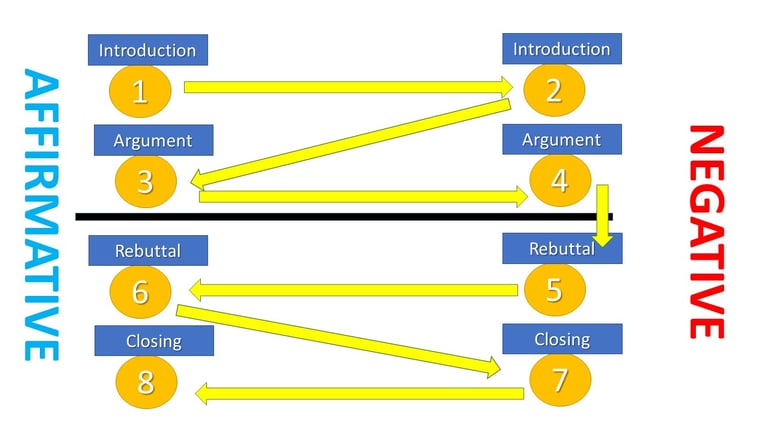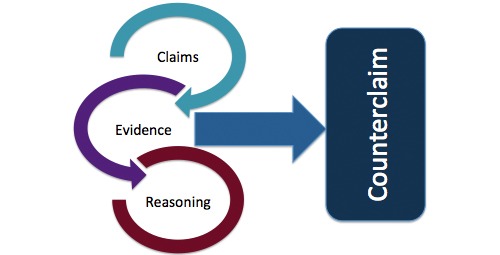Welcome to Wribate™
Want to make a difference in the world? Yearning for a sense of meaning or purpose in life? A wide variety of subject-matters is open to Wribate – from Politics to Economy, from Technology to Religion.


Shape the Future, Amplify Your Voice
You didn’t come this far to stop


Empowering the Next Generation of Thinkers
In a rapidly changing world, the ability to think critically, communicate effectively, and argue persuasively is more important than ever. At Wribate™, we provide students with the tools and opportunities to hone these essential skills through written debate.
Whether you’re a student looking to sharpen your communication, an educator wanting to inspire critical thinking, or a parent seeking to nurture your child's intellectual growth, Wribate™ is here to guide you every step of the way.






Why Choose Wribate™?
Develop Critical Thinking: Wribate™ challenges students to analyze complex issues from multiple perspectives, fostering deeper understanding and sharpening their critical thinking skills.
Enhance Writing and Communication: Through structured written debates, students learn to craft persuasive arguments, communicate ideas clearly, and express themselves with confidence.
Foster Empathy and Respect: By engaging with opposing viewpoints, students develop empathy, learning to respect diverse opinions and communicate with grace.
Prepare for the Future: The skills gained through Wribate™—critical thinking, research, and persuasive writing—prepare students for academic success and future leadership roles.




Wribating
Master the Art of Wribate: Tips and Strategies for Success
Wribating is a powerful skill that sharpens your ability to think critically, argue persuasively, and communicate effectively. Whether for formal competitions or everyday communication, mastering Wribate™ can set you apart as a clear, thoughtful communicator.


1. Understanding the Structure of Wribate
A successful Wribate requires more than just facts—it involves strategy, structure, and persuasive writing. Here's the key structure to follow:
Opening Statements: Introduce your argument clearly and confidently, setting the foundation for your position.
Argument Presentation: Present well-researched evidence to support your stance, using logical reasoning to build a solid case.
Rebuttal: Counter your opponent’s arguments thoughtfully and respectfully, addressing their claims with evidence.
Closing Statements: Summarize your key points, reinforcing your position and leaving a lasting impression.




2. Research and Preparation
Preparation is key to crafting compelling written arguments:
Know Your Topic: Dive deep into your subject matter. Gather credible sources, facts, and perspectives to support your case.
Understand Opposing Viewpoints: Research your opponent’s likely arguments and prepare well-supported rebuttals.
Outline Your Ideas: Organize your thoughts in a clear outline before writing. This will help structure your argument logically and avoid unnecessary digressions.




3.Building Strong Written Arguments
To win a Wribate, you must present persuasive arguments:
Clear Structure: Start with a clear thesis or claim, followed by supporting evidence and explanations. Each paragraph should build on the last.
Use Rhetorical Devices: Enhance your arguments with analogies, metaphors, or relevant anecdotes to make them more relatable and memorable.
Acknowledge Counterarguments: Present the opposing view fairly, then refute it respectfully with evidence, showing you've considered multiple perspectives.




4. Mastering Written Delivery
How you present your arguments in wribates can be just as impactful as the content:
Write Clearly and Concisely: Avoid jargon or overly complex language. Aim for clarity and precision in every sentence.
Be Persuasive Yet Respectful: Balance conviction with courtesy. Persuasive writing is about presenting your views confidently while respecting the opinions of others.
Maintain Coherence and Flow: Ensure your arguments flow logically from one point to the next, creating a seamless narrative that strengthens your case.




5.Crafting Effective Rebuttals
A strong rebuttal can make or break a Wribate:
Listen and Analyze: Carefully read and understand your opponent’s arguments. Identify weaknesses or logical flaws you can address.
Stay Focused and Respectful: While it’s tempting to challenge your opponent harshly, always keep your rebuttals focused on the argument, not the person.
Use Evidence: Base your rebuttals on solid, fact-checked evidence, and make sure they directly address the opponent’s claims.




6. Using Persuasive Writing Techniques
Great wribate isn't just about presenting facts—it's about persuading your reader:
Tell Stories: Incorporating relatable stories or real-life examples can make your argument more compelling and memorable.
Use Analogies: Simplify complex ideas by relating them to familiar concepts or situations.
Appeal to Emotion: While logic is key, don't hesitate to appeal to your reader's emotions to make your argument more relatable and impactful.




7.Handling Difficult Counterarguments
In wribate, it’s important to address difficult or aggressive counterarguments with grace:
Stay Calm and Focused: If your opponent’s arguments seem aggressive or unfair, focus on the content rather than personal attacks.
Use Logic to Redirect: If your opponent tries to derail the discussion, steer the conversation back to the key issue with logical reasoning and evidence.




8.Refining Your Writing
The best Wribaters are always refining their writing skills:
Edit and Revise: After writing your wribate, take the time to revise for clarity, logic, and flow. Strong wribate is polished writing.
Seek Feedback: Share your wribate with thought leaders, mentors or peers for constructive feedback. Others' perspectives can help you improve your arguments.
Practice Consistently: Regular practice is key. The more you write and refine your arguments, the stronger and more persuasive you will become.


Final Thoughts
Mastering the art of Wribate involves not just presenting facts, but constructing logical, persuasive arguments and delivering them clearly and respectfully. By honing your research, writing, and rebuttal skills, you can become an effective and compelling writer and leader for any situation.
Start Your Journey
Visit Wribate.com today to access valuable resources, tools, and tips that will help you become a skilled and confident Wribater. With practice and preparation, you’ll master the art of persuasive written communication and make your arguments stand out.
To your success,
The Wribate Team


innoRize Enterprises Private Limited
Building impactful applications and solutions for underserved folks
Connect
Explore
contact@inno-rize.com
+91-8977239459
© 2025. All rights reserved.
